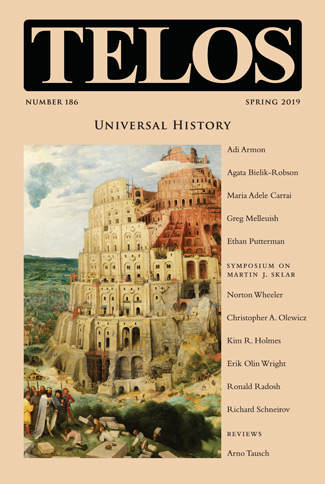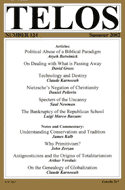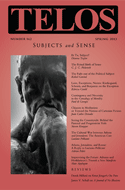By Ethan Putterman · Thursday, April 11, 2019 Ethan Putterman’s “Locke and ‘War by Design’” appears in Telos 186 (Spring 2019). Read the full article at the Telos Online website, or purchase a print copy of the issue in our online store. Individual subscriptions to Telos are available in both print and online formats.
 Few passages in John Locke’s writings are more controversial than the incongruous descriptions of the state of nature in chapters III and IX of the Second Treatise on Government. A hodgepodge of opposites where men live at once in a “State of Peace, Good Will, Mutual Assistance, and Preservation” yet remain “very unsafe, very unsecure,” Locke’s state of nature is, according to John Dunn, “probably the most misunderstood idea in the English radical’s political philosophy.” In this article, I explore Locke’s epistemology behind humankind’s comprehension of natural law to argue that his state of nature is more consistent than appears. I demonstrate that the symmetry of the philosopher’s state of nature is best understood by way of the theory of knowledge in his Essays on the Law of Nature and Essay Concerning Human Understanding. Few passages in John Locke’s writings are more controversial than the incongruous descriptions of the state of nature in chapters III and IX of the Second Treatise on Government. A hodgepodge of opposites where men live at once in a “State of Peace, Good Will, Mutual Assistance, and Preservation” yet remain “very unsafe, very unsecure,” Locke’s state of nature is, according to John Dunn, “probably the most misunderstood idea in the English radical’s political philosophy.” In this article, I explore Locke’s epistemology behind humankind’s comprehension of natural law to argue that his state of nature is more consistent than appears. I demonstrate that the symmetry of the philosopher’s state of nature is best understood by way of the theory of knowledge in his Essays on the Law of Nature and Essay Concerning Human Understanding.
Continue reading →
By Michael Millerman · Tuesday, July 16, 2013 As an occasional feature on TELOSscope, we highlight a past Telos article whose critical insights continue to illuminate our thinking and challenge our assumptions. Today, Michael Millerman looks at Luigi Marco Bassani’s “The Bankruptcy of the Republican School,” from Telos 124 (Summer 2002).
 Luigi Marco Bassani’s essay “The Bankruptcy of the Republican School” (2002) consists of an overview of the conflict in American historiography between two schools of thought. The first—Lockean liberalism—insists that America was founded on principles that recognize an abstract, natural right to life, liberty, property, and the pursuit of one’s private happiness. These natural rights are liberties that define a private sphere, to be protected from government interference. By contrast, the second school proclaims that not Lockean liberalism, but rather republicanism informed the Founders’ vision of what America is and should be. Republicanism elevates such notions as “the common good” and “the public sphere” above those of “individual liberties” and “private happiness.” Indeed, it can justify infringing on the latter for the sake of the former. Hence, it is in conflict with Lockean liberalism. Luigi Marco Bassani’s essay “The Bankruptcy of the Republican School” (2002) consists of an overview of the conflict in American historiography between two schools of thought. The first—Lockean liberalism—insists that America was founded on principles that recognize an abstract, natural right to life, liberty, property, and the pursuit of one’s private happiness. These natural rights are liberties that define a private sphere, to be protected from government interference. By contrast, the second school proclaims that not Lockean liberalism, but rather republicanism informed the Founders’ vision of what America is and should be. Republicanism elevates such notions as “the common good” and “the public sphere” above those of “individual liberties” and “private happiness.” Indeed, it can justify infringing on the latter for the sake of the former. Hence, it is in conflict with Lockean liberalism.
Continue reading →
By Rahul Govind · Wednesday, April 24, 2013 Rahul Govind’s “The Fade-out of the Political Subject: From Locke to Mill” appears in Telos 162 (Spring 2013). Read the full version online at the Telos Online website, or purchase a print copy of the issue in our store.
 The following essay takes as its conceptual core an investigation into the relation between time and political subjectivity, which is undertaken through a reading of John Locke and John Stuart Mill. The latter’s theorization of liberty and progress is contrasted to the former’s understanding of the political subject via an eschato-theological understanding of time. Ultimately Mill’s position—as a “stand-in” for modernity—will be found to be unjustifiable in its uncritical distinguishing between time and the (political) subject, thereby laying the groundwork for what is perhaps the dominant paradigm of political philosophy today: political not metaphysical. A subplot in the essay argues that Mill’s well-known endorsement of British imperialism can be traced to these problems besetting the theoretical relations between political liberty, time, and notions of progress. Through a constructive reading of Mill (finding echoes and cross-stitching the System of Logic and his political writings) and Locke (finding echoes and cross-stitching the Treatises and Reasonableness of Christianity), we hope to revisit the problem of the political subject though time. In the light of this, the conclusion engages the work of Foucault and Koselleck as they “overlap” in an evaluation of modernity in its temporal articulation. The following essay takes as its conceptual core an investigation into the relation between time and political subjectivity, which is undertaken through a reading of John Locke and John Stuart Mill. The latter’s theorization of liberty and progress is contrasted to the former’s understanding of the political subject via an eschato-theological understanding of time. Ultimately Mill’s position—as a “stand-in” for modernity—will be found to be unjustifiable in its uncritical distinguishing between time and the (political) subject, thereby laying the groundwork for what is perhaps the dominant paradigm of political philosophy today: political not metaphysical. A subplot in the essay argues that Mill’s well-known endorsement of British imperialism can be traced to these problems besetting the theoretical relations between political liberty, time, and notions of progress. Through a constructive reading of Mill (finding echoes and cross-stitching the System of Logic and his political writings) and Locke (finding echoes and cross-stitching the Treatises and Reasonableness of Christianity), we hope to revisit the problem of the political subject though time. In the light of this, the conclusion engages the work of Foucault and Koselleck as they “overlap” in an evaluation of modernity in its temporal articulation.
Continue reading →
|
|
 Few passages in John Locke’s writings are more controversial than the incongruous descriptions of the state of nature in chapters III and IX of the Second Treatise on Government. A hodgepodge of opposites where men live at once in a “State of Peace, Good Will, Mutual Assistance, and Preservation” yet remain “very unsafe, very unsecure,” Locke’s state of nature is, according to John Dunn, “probably the most misunderstood idea in the English radical’s political philosophy.” In this article, I explore Locke’s epistemology behind humankind’s comprehension of natural law to argue that his state of nature is more consistent than appears. I demonstrate that the symmetry of the philosopher’s state of nature is best understood by way of the theory of knowledge in his Essays on the Law of Nature and Essay Concerning Human Understanding.
Few passages in John Locke’s writings are more controversial than the incongruous descriptions of the state of nature in chapters III and IX of the Second Treatise on Government. A hodgepodge of opposites where men live at once in a “State of Peace, Good Will, Mutual Assistance, and Preservation” yet remain “very unsafe, very unsecure,” Locke’s state of nature is, according to John Dunn, “probably the most misunderstood idea in the English radical’s political philosophy.” In this article, I explore Locke’s epistemology behind humankind’s comprehension of natural law to argue that his state of nature is more consistent than appears. I demonstrate that the symmetry of the philosopher’s state of nature is best understood by way of the theory of knowledge in his Essays on the Law of Nature and Essay Concerning Human Understanding.  Luigi Marco Bassani’s essay “The Bankruptcy of the Republican School” (2002) consists of an overview of the conflict in American historiography between two schools of thought. The first—Lockean liberalism—insists that America was founded on principles that recognize an abstract, natural right to life, liberty, property, and the pursuit of one’s private happiness. These natural rights are liberties that define a private sphere, to be protected from government interference. By contrast, the second school proclaims that not Lockean liberalism, but rather republicanism informed the Founders’ vision of what America is and should be. Republicanism elevates such notions as “the common good” and “the public sphere” above those of “individual liberties” and “private happiness.” Indeed, it can justify infringing on the latter for the sake of the former. Hence, it is in conflict with Lockean liberalism.
Luigi Marco Bassani’s essay “The Bankruptcy of the Republican School” (2002) consists of an overview of the conflict in American historiography between two schools of thought. The first—Lockean liberalism—insists that America was founded on principles that recognize an abstract, natural right to life, liberty, property, and the pursuit of one’s private happiness. These natural rights are liberties that define a private sphere, to be protected from government interference. By contrast, the second school proclaims that not Lockean liberalism, but rather republicanism informed the Founders’ vision of what America is and should be. Republicanism elevates such notions as “the common good” and “the public sphere” above those of “individual liberties” and “private happiness.” Indeed, it can justify infringing on the latter for the sake of the former. Hence, it is in conflict with Lockean liberalism.  The following essay takes as its conceptual core an investigation into the relation between time and political subjectivity, which is undertaken through a reading of John Locke and John Stuart Mill. The latter’s theorization of liberty and progress is contrasted to the former’s understanding of the political subject via an eschato-theological understanding of time. Ultimately Mill’s position—as a “stand-in” for modernity—will be found to be unjustifiable in its uncritical distinguishing between time and the (political) subject, thereby laying the groundwork for what is perhaps the dominant paradigm of political philosophy today: political not metaphysical. A subplot in the essay argues that Mill’s well-known endorsement of British imperialism can be traced to these problems besetting the theoretical relations between political liberty, time, and notions of progress. Through a constructive reading of Mill (finding echoes and cross-stitching the System of Logic and his political writings) and Locke (finding echoes and cross-stitching the Treatises and Reasonableness of Christianity), we hope to revisit the problem of the political subject though time. In the light of this, the conclusion engages the work of Foucault and Koselleck as they “overlap” in an evaluation of modernity in its temporal articulation.
The following essay takes as its conceptual core an investigation into the relation between time and political subjectivity, which is undertaken through a reading of John Locke and John Stuart Mill. The latter’s theorization of liberty and progress is contrasted to the former’s understanding of the political subject via an eschato-theological understanding of time. Ultimately Mill’s position—as a “stand-in” for modernity—will be found to be unjustifiable in its uncritical distinguishing between time and the (political) subject, thereby laying the groundwork for what is perhaps the dominant paradigm of political philosophy today: political not metaphysical. A subplot in the essay argues that Mill’s well-known endorsement of British imperialism can be traced to these problems besetting the theoretical relations between political liberty, time, and notions of progress. Through a constructive reading of Mill (finding echoes and cross-stitching the System of Logic and his political writings) and Locke (finding echoes and cross-stitching the Treatises and Reasonableness of Christianity), we hope to revisit the problem of the political subject though time. In the light of this, the conclusion engages the work of Foucault and Koselleck as they “overlap” in an evaluation of modernity in its temporal articulation. 

